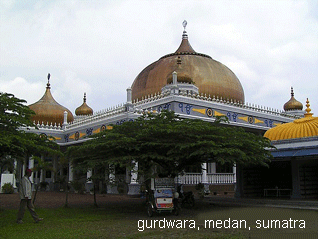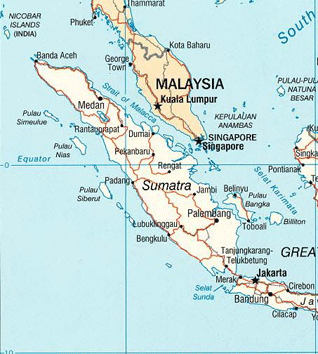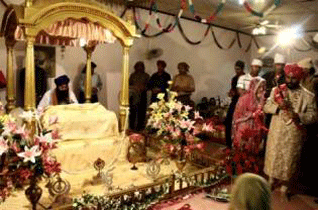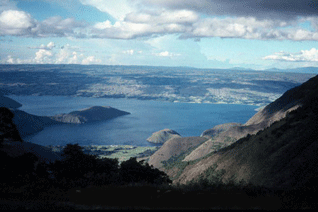Travel
The Sikhs of Sumatra, Indonesia
by PUTRI FITRIA
If you have been to the North Sumatra capital of Medan, you may well
have passed through an area of the city known to locals as Kampung
Keling.
For decades, Kampung Keling has been well known among residents as a settlement of Sikhs and other communities from the sub-continent.
Although
city administrators tried to change its official name to Kampung Madras
- the word keling connotes dark skin and is considered offensive to some -
the change didn't take place and the enclave remains popularly known as
Kampung Keling.
Walking through the area, it is hard to miss the
Sikhs who live there. They are one of the subcontinent's main ethnic
groups from a northern region straddling the border dividing India from
Pakistan.
The men are tall, dark and handsome, wearing
traditional turbans and long beards, while the women have sharp features
and often don bright salwar kameezes.
The culture and religious beliefs
of the Sikh residents who live there have added a dimension to Medan's
diversity, yet most Indonesians know little about them.
Their
striking appearance and unfamiliar customs of the enclave's dwellers
have added to their mystique among locals. But, with a little effort,
it's surprisingly easy to lift the veil on Sikh and Punjabi culture in Medan.
Once
you do, you'll find a warm and welcoming people who are not only
committed to preserving their own culture and traditions, but also proud
to be Indonesian.
Some time ago, while shopping at a sports
store in Kampung Keling, I met a friendly middle-aged Sikh man, Giani
Dalwinder Singh.
Our conversation on that hot sunny day was
very interesting as he enthusiastically told me about Sikh-Medanese
culture and history.
He eventually ended up inviting me to a family wedding, a courtesy that I happily accepted.
The
wedding was to be held in a gurdwara - a local Sikh place of worship
doubles as an important community center for members of the enclave.
This
particular building was raised in 1955 and was decorated with passages
of wisdom from Guru Granth Sahib, the Scripture of the Sikhs, consisting of spiritual writings, some dating
back to the 16th century.
"The Punjabi identity is closely tied to the Sikh religion. A real Punjabi must adhere to the Sikh ways," Giani explained.
The
history of Sikh existence in North Sumatra can be traced back to
Amritsar and Jullundur in Punjab. Sikhs first arrived in
northern Sumatra in the 18th century through Aceh.
Most of them came as traders who settled in the area and slowly dispersed throughout northern Sumatra.
Another
group of Sikhs arrived as part of the army brought to Indonesia
by the British colonial administration. The troops brought over included a Sikh regiment.
Some of
these troops were sent to Indonesia to supply arms to the Dutch who
were struggling to suppress Indonesia's demands for independence.
When
the Sikh soldiers saw the way the Dutch were oppressing of the local
Indonesian population, many switched sides, taking over Dutch ships and
joining the locals in their fight for freedom.
Many of these Sikh soldiers eventually settled in Sumatra.
When
I arrived at the wedding, I wasn't sure what to expect, but I was
quickly put at ease by a combination of tabla (Sikh percussion
instruments), and the teasing rhythmic accompaniment of Punjabi singing.
It all blended into a symphony called the Sikhs call 'simran'.
'Simran'
means to remember, and is a method of contemplative meditation using
repetition, which Sikhs believe enables them to reach a kind of state of
rapture.
Believe me, it works. The beautiful, rhythmic music
put me in a blissful trance-like state as I watched the elaborate
nuptials unfold. The bride and groom sat in front of the Guru
Granth Sahib while a granthi read out loud from pages of the Scripture.
Holding one end each of a long scarf, the couple then encircled the Guru Granth four times, asking for a blessing at each pass.
Bread and milk, Punjabi delicacies, were served after the wedding.
"We
are Punjabi people! Our food will always survive, even though our
grandparents have stayed here for a long time. Try how it tastes,"
Pritam Singh Chabal, a Sikh official, urged with a warm smile.
Pritam,
a prominent figure among the Sikh-Medanese, introduced me to people
at my table, including several gurdwara custodians.
I was struck
by how open and receptive everyone was, a trait that I couldn't help
but realize flew in the face of their reclusive, mysterious reputation
among many Indonesians.
As I fell into conversation, I couldn't
help but notice that, along with fiercely protecting their unique
culture, this exotic group was also thoroughly Indonesian.
From
their chatting, I noticed that they were speaking Bahasa Indonesia with
a distinct dialect. The stories and talk told the tale of people deeply
involved with this country.
Today, there are approximately
1,000 Sikhs living throughout North Sumatra. Many are businesspeople
and merchants, but a large segment of the group have become famous for
their ability to breed cows for milking.
Sikhs in
Sumatra continue to preserve their ways. When asked about their wishes
in relation to their social status as non-indigenous people, one of the
men at the wedding answered:
"We wish there would be no discrimination against us in the future. We do come from [Punjab], but we are Indonesian now."
[Courtesy: Jakarta Globe]
August 27, 2010
Conversation about this article
1: Gurcharan Singh Kulim (London, United Kingdom), August 27, 2010, 6:37 PM.
It is not surprising as Sikh settlements have existed in Sumatra from about 1898 when the Malay archipelago began to be policed by Sikhs. Although the origins of the Sumatran Sikhs is not from the early police like it is in neighboring countries, but more from herd farmers and businessmen who went out there in search of new opportunities. I wrote an article on these Sikhs about 10 years ago. There are more than 15000 today, spread all over Sumatra. There are a total of nine gurdwaras in Sumatra.
2: Gurinder Singh (Stockton, California, U.S.A.), August 28, 2010, 11:17 AM.
Medan, Indonesia was the area where Sikhs settled to begin with. They were mostly in dairy farming. Few of them had good education like Sardar Partap Singh. His son later became Secretary of Agriculture, Indonesia. He and his brother, who was Secretary of Indonesia Hockey Federation, maintained their Sikh identity. Sikhs of Medan opened a Khalsa High school and the medium of instruction was English. That was a good effort in a country where knowledge of English was scant. Later on, these Sikhs moved to Jakarta and are mostly in the sports-goods business. I had met quite a few of them during my Jakarta visits and have very fond memories of them.
3: Gurpal Singh Bhuller (Chester, Virginia, U.S.A.), August 31, 2010, 9:52 PM.
There may be others on this forum who might know more about this, but I understand that there were several gurdwaras in the Acheh area of Sumatra. Also, just after the WW II (Acheh is on the northern-most part of Sumatra), as the Acheh insurgency rose, a particularly virulent form of Islam came to the fore and did not treat minorities kindly. Most of the Sikhs there left and settled in Medan and Palembang. I do not know the fate of the gurdwaras there now or if there are still Sikhs in the Acheh area. Now that the insurgency has run its course, I wonder how is the travel into that area.
4: Gurcharan Singh Kulim (London, United Kingdom), September 01, 2010, 5:56 PM.
The number of Sikhs stated as 1000 is very erroneous. There are about 15,000 in Sumatra. The gurdwaras exist in Sianter, Palembang and several other cities which I can't recall now. I visited Medan in 2006 and was pleasantly surprised to find Sikhs outside Medan. The Sikh history of Sumatra was supplemented by the INA (Indian National Army) and Sikh units that came in before and after the Japanese war. The current first Secretary of Agriculture Indonesia (sorry, I cannot recall his name) is a full Sardar, but married to a Indonesian Muslim lady who is a lecturer in Medan. I met them at a reception in the main gurdwara in Medan.
5: Amarjit Singh (Kuwait), September 14, 2010, 6:33 AM.
I was not surprised but I felt proud that Sikhs exist in Indonesia. I have been in a Gulf country for the last 15 years and was educated in a Catholic school. But I find that Sikhism is the only religion which never forces or requests others to convert. But I have experienced people coming on their own volition and requesting you to assist them in becoming Sikhs. Proud to be a Sikh!
6: Dolly Malkiat Kaur Sidhu (Chandigarh, Punjab), February 25, 2011, 2:11 AM.
First of all, I'm proud to be Sikh. Then, I'm proud of Sikh-Indonesians. All Sikhs living in Indonesia are still following their Sikh values, culture and customs. So, I'm proud I was born in Indonesia. And most proud of Sikhs living in Sumatra!
7: S. Singh (Lubuk Pakam, Indonesia ), April 30, 2011, 8:01 PM.
I never thought they would write a story about us. That being said, we've been living here for many generations. For the time being, our struggle is to educate and inform our future generations about our beliefs, traditions and culture. Thank you, sikhchic.com for this article about us.
8: Dev Singh Sandhu (Miri, Sarawak), June 29, 2011, 3:52 AM.
I am pleased to read that Sikhs are living in Medan just like us in Sarawak (Borneo). We are 50 families but maintain Sikh values and culture, and foster closeness with all our families. We speak Chinese, Malay and Dayak languages. I want to say that the Sikhs in Sumatra are doing a wonderful job. I hope to visit them soon.
9: Mampreet Singh Sanghu (Ludhiana, Punjab), October 11, 2011, 6:47 AM.
I never thought there would be Sikhs in Sumatra. They are doing great. Really happy to ready this, as I expect to be moving to Indonesia shortly. I hope to visit them soon.
10: Harjit Singh (Malaysia), October 14, 2011, 1:13 PM.
I have just moved to Indonesia to start my betel-nut business. It comes as a surprise that there are also Sikhs in Medan. I would be pleased to meet you guys for networking. Please contact me at harjit81@streamyx.com
11: Mahinder Singh Padda (United States), June 29, 2012, 12:55 PM.
I was born and raised in P. Siantar, N. Sumatra. And lived there for about 27 years. I'm very happy to be a Sikh-Indonesian.
12: Partap Singh Saini (Melbourne, Australia), September 14, 2012, 7:02 AM.
I was born in Punjab, and after I finished my graduation I moved to Australia in 2006. I never thought there would be Sikhs in Indonesia. One year ago I met with a Sikh family belonging to Tangerang (Indonesia). They are a really nice family. I was pleased to meet them. Sikhs are living in Indonesia same like us. I expect to be going to Indonesia next year and meet with Sikhs there. Sat Sri Akal to all Sikh-Indonesians.
13: Anand Ashram (Ubud, Bali, Indonesia), November 02, 2012, 5:34 AM.
With the grace of Waheguru, on November 21 this year (2012), we shall reinstall the 60+ years old bir of Guru Granth Sahib ji in our ashram. This will be the first time ever on the isle of Bali. The Bir was preserved by our founder, a gift from his parent. However, since this is in the original Gurmukhi and none of us here can read, so beside the original, we shall also keep the English Translation, which will be used for daily reading. A visiting Bhai Sahib from Punjab shall preside over the ceremony. We need your blessings, and if ever in Bali, do please visit us (www.ubud.anandashram.asia, email: ubud@anandashram.asia). Sat Sri Akal.
14: Kuljit Singh (Malaysia), February 28, 2013, 3:38 AM.
I never thought there would be Sikhs in Sumatra. I am really very happy to know this. I am married to a Indonesian lady from Surabaya and now we're planning to move to Surabaya. Hoping to meet you all soon.
15: Dalvinder Singh (London, United Kingdom), March 24, 2013, 6:48 PM.
I feel proud that we have Sikh brothers and sisters living in Sumatra. I would like to know more history and background: when they came here, etc. And sharing old photographs would be great too.
16: Yudiastuti (Denpasar, Bali, Indonesia), April 02, 2013, 12:36 AM.
I'm a Balinese Hindu. I only had a glimpse of the Sikhs while studying during history in school. Until about one year ago, when I met a very good harmonium player and singer who I, found out, was a Sikh. His father is also a very good singer and harmonium player. They are really nice and warm men. About a week ago I bought a book titled "Alpha & Omega Spiritualitas - Japji bagi Orang Modern" (Japji for Modern People) written by Anand Krishna (Founder of Anand Ashram). The book contains magnificent excerpts from the Guru Granth Sahib, beautifully translated and commented on. It's very interesting! Makes me know of the beauty of the teachings of Guru Nanak and eager to know more about the Sikh community in Indonesia.
17: Jaswant Singh Mogewala (Singapore), May 15, 2013, 3:58 AM.
Sikhs are in all parts of Indonesia and there are a great number of gurdwaras too. Sikh-Indonesian are well off, better than their counterparts elsewhere in the diaspora. They are very hospitable, helpful, polite and friendly.
18: Diljit Singh Bahra (United Kingdom), May 24, 2013, 7:35 AM.
I am interested to know if any Sikhs have played international hockey for Indonesia. Information for my web site, Sikhs in Hockey at www.sikhsinhockey.com
19: Gurcharan Singh Kulim (London, United Kingdom), October 04, 2013, 11:34 PM.
Indonesia has had a number of Sikh sportsmen. A long distance runner; two outstanding hockey players - Dzalie Hardial Singh and his elder brother who at one time captained the Indonesian hockey team. I simply cannot recall his name.
20: Hardyal Singh Chohan (London, United Kingdom), October 16, 2013, 5:21 AM.
I had the good fortune to visit the gurdwara in Medan last weekend and was pleasantly surprised at its size and also the love that was given to my friend and I by the sangat. Sat Sri Akal. Terima Kasih.
21: Dr D P Singh (New Delhi, India), February 10, 2014, 4:53 AM.
It makes me feel great that the Sikhs in Medan make us proud of our religion. Keep it up, all of you!
22: Gurinder Singh (Stockton, California, U.S.A.), September 27, 2014, 9:07 AM.
A long distance runner from Indonesia was Gurnam Singh. He may have won a medal in the Asian Games. President Sukarno honoured him. Raj Kumar Singh is son of partap Singh of Medan. He was President of Indonesian Hockey Federation for a number of years. I was there in 1994. At that time I met a Sikh boxer who was representing Indonesia at the international level. He was also from Medan.
23: Dr. Sarjit Singh Gill (Malaysia), November 28, 2014, 9:15 AM.
Sikhs has made many significant contributions in Indonesia. They are a peace loving community. The Government of Indonesia should recognise the Sikh community in Indonesia and Sikhism as their religion, officially. Sikhs are not Hindus as they have been categorized by the state. We hope and pray the newly elected President Jokowi will do some justice to this minority community.
24: Dr H S Puri (USA), February 26, 2015, 10:10 PM.
It is a pleasure to find the details about Sikhs in Sumatra. My maternal uncle moved to Surybaya in the 1930s and what we knew as kids as Java Sumatra. The progress made by the Sikh community in both Malaysia and Indonesia is astonishing and their relations with the Muslim majority is praiseworthy, particularly near Aceh. I hope to visit the area in near future.






